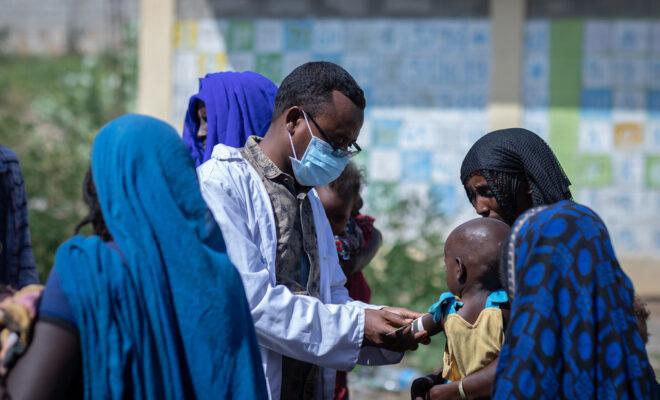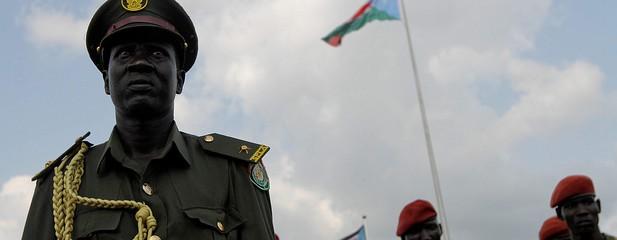Tigray needs aid now, with or without the Ethiopian government’s consent

The aid blockade is illegal. The international community must call this out and not allow humanitarian needs to be politicised.

A mobile health and nutrition team providing critical services to displaced people in Afar region, which neighbours the Tigray region in Ethiopia. Credit: UNICEF Ethiopia/2021/Mulugeta Ayene.
Nearly 15 months into the civil war in Ethiopia, the humanitarian crisis in the Tigray region is dire. Millions of people have been left with nothing to eat and no medicine for even easily treatable conditions. Over a million people are under active famine conditions and hundreds, if not thousands, have already died. And the UN has already identified the situation in Tigray as the worst hunger crisis the world has seen in over a decade.
In October 2021, the head of the World Food Programme said of Tigray: “there’s no way that the people are surviving there”. More recently, the UN’s humanitarian chief called the lack of meaningful international action a “stain on our conscience”. And the World Health Organisation director general in January 2022 described the crisis as “an insult to our humanity”.
In one statement after another, various UN agencies have implored the Ethiopian government to open unfettered humanitarian access to Tigray. Yet despite their words, little has changed.
To address the crisis more meaningfully, it is crucial to first recognise the systematic nature of what has led to it. Close research shows how the situation in Tigray was deliberately engineered through the decimation of the region’s Tigray’s economy and livelihoods, including the destruction of agriculture, economic infrastructure, and financial systems. While all parties in the war have been accused of atrocities, this intentional depredation was orchestrated by the Ethiopian and Eritrean armies along with allied Amhara militia and has deprived millions of people of the basic means of survival.
At the same time, the Ethiopian government continues to suspend essential services, including communications, banking, transportation, and electricity. And it still refuses to fully remove its blockade, preventing the delivery of urgent humanitarian aid. When relief organisations have been able to deploy staff to Tigray, their efforts to restock their dwindling supplies have repeatedly been hijacked, including through the looting of aid trucks, destruction of vital bridges, and attacks on drivers and aid convoys. In October 2021, the Ethiopian government even timed air strikes to coincide with humanitarian flights to Tigray, forcing the UN to abandon its delivery of emergency supplies. And in January 2022, drone attacks resulted in massive civilian casualties that halted the transport of aid to the region and led aid agencies to suspend their work in parts of Tigray.
Taken together, these acts clearly point to the use of starvation as a weapon of war to collectively punish the Tigrayan people. Yet shockingly, international bodies lack the political will to call out the deliberate nature of these violations. Instead of articulating clear demands and following up with actions that hold the Ethiopian government accountable, the international community continues to offer statements of concern and lukewarm demands.
Under international law, states have the primary responsibility to meet their citizens’ basic needs and it is illegal to block aid, even during times of conflict. But despite these clear legal provisions, relief has become politicised in Ethiopia. Efforts to end the humanitarian crisis in Tigray have been tied to political conditions for a negotiated cessation. Diplomatic efforts continue to ignore the Ethiopian government’s legal responsibility to provide essential services and facilitate aid delivery.
By setting conflict resolution as a precondition for humanitarian access, the Ethiopian government has also created a highly politicised and polarised environment in which anyone who speaks out about the blockade is labelled an enemy of the state. This has had grave consequences for aid workers who have faced endless red tape, expulsion, harassment, detention, and even death. More than 20 aid workers have been killed since the conflict started.
Hanging by a thread
More than a year into the conflict, we know that millions in Tigray are in dire need of humanitarian relief. Many leaders of aid agencies have expressed their deep fears about the unfolding catastrophe. But we still do not know the full scope of the crisis. The Ethiopian government’s media blackout on Tigray continues making information scarce, though limited coverage has emerged of malnourished infants struggling to breathe, children wasting away, lactating mothers unable to produce milk, and the elderly too weak to sit or stand. The situation is likely even worse in areas that are more remote and harder to access.
Aid agencies are now left with only one viable option: to deliver life-saving aid by air as a matter of absolute priority. This will require the declaration of a no-fly zone in Tigray to protect humanitarian workers and civilians from drone attacks. The fact that centres for internally-displaced persons and aid convoys have previously been hit by drones suggest that without a no-fly zone, Ethiopian forces may not hesitate to conduct indiscriminate attacks.
The UN, however, must also go further in line with its primary responsibility to protect human rights across the globe and its specific responsibilities under Resolution 2417/2018 in situations of conflict. This resolution states when a sitting government has no political will or desire to save its own citizens from mass death resulting from starvation, lack of basic medical care and lack of essential services, the UN should “compel parties to conflict to ensure full humanitarian access”.
The UN must be reminded of these responsibilities. It must ensure the delivery of cross-border humanitarian aid with or without the consent of the Ethiopian government and establish a mechanism to monitor implementation. Just as it did for Syria in 2016, the UN must urgently approve and initiate the air dropping of emergency food and medicine.
With each passing day, the situation in Tigray is rapidly deteriorating. Millions of people are out of time, and failure to act now will result in mass deaths. It is time the UN and the rest of the international community address this crisis with the desperate attention, authority, and urgency it deserves.






Yes tigray needs assistance and who is to blame for all this calamity? The very tplf which ruined Ethiopia for 27 years and now is taking the hapless people of tigray to hell. What a sad story and the world is just watching by.
Written by 3 TPLF support ers.
1. Who started this war/?
2. Who used the ceasefire by Ethiopia to invade Afar and Amhara.
3. Who stole 500 Aid trucks claiming there was no fuel to send them back and then used them to invade Amhara
4. Who is currently attacking the people of Afar and thus blocking the very road needed for food aid trucks/
But why don’t you call to TPLF to stop its fighting in northern Afar which blocked the road for aid moving into Tigray?
For us it’s clear the ‘HUB’ is a mouthpiece of TPLF. the call for airdropping has aimed at rebuilding military capability of the Terrorist Junta.
This article fully ignored the role of TPLF in the prevention of aid supplies by making the single supply road for Afar a war zone. TPLF is currently shelling Afar with heavy weapons. 300000 people are displaced and a lot of civilian are dead. The invitation community should condemned and stops this terrorist group.
Talk to TPLF like this.